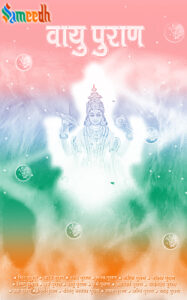The Vayu Puran is one of the eighteen Mahāpurāṇs in Hinduism, and it is dedicated to Lord Vayu, the god of wind and a manifestation of Lord Shiv. Like other Purans, the Vayu Puran is a vast and comprehensive text that covers a wide range of topics, including cosmology, mythology, genealogies, rituals, and moral teachings.

The Vayu Puran begins with the creation of the universe, detailing the cosmological aspects, the evolution of the world, and the cyclical nature of creation and dissolution. Similar to other Purans, the Vayu Puran includes genealogies of gods, sages, and various dynasties. It provides information about the lineage of important figures and their contributions to the world.
The Puran contains numerous mythological stories, recounting tales of gods, goddesses, and legendary beings. These stories often convey moral, ethical, or spiritual lessons. Given that the Puran is dedicated to Lord Vayu, it explores the attributes, manifestations, and significance of Vayu in Hindu mythology. Vayu is considered a vital force responsible for sustaining life.
Here are a couple of notable stories from the Vayu Puran:
- Vayu’s Devotion to Shiv: The Vayu Puran highlights the deep devotion of Vayu, the god of wind, to Lord Shiv. In one story, Vayu performs intense penance to please Shiv and is eventually blessed with the boon of being able to travel freely across the universe. This underscores the importance of devotion and austerities in Hindu mythology.
- Birth of Hanuman: One version of the birth of Hanuman, the devoted monkey-god and ardent devotee of Lord Ram, is found in the Vayu Puran. According to this narrative, Hanuman is born to Anjana and Kesari, both of whom were monkeys and devotees of Lord Shiv. Lord Vayu is said to have carried the divine power of Shiv to Anjana’s womb, leading to Hanuman’s birth.
These stories may vary in details across different versions and retellings, and interpretations can differ based on regional and sectarian traditions within Hinduism. It’s also worth noting that the Vayu Puran, like other Purans, serves multiple purposes, including religious instruction, moral guidance, and the preservation of cultural and mythological heritage.
The Vayu Puran discusses various rituals, ceremonies, and modes of worship. It provides guidance on performing religious duties and highlights the importance of devotion to the divine. The Puran describes different regions, rivers, and pilgrimage sites, emphasizing the religious significance of specific places. Like many Puranas, the Vayu Puran imparts moral and ethical teachings. It explores the concepts of dharma (righteousness) and the consequences of virtuous and sinful actions. The text engages in philosophical discussions on topics such as the nature of the self, the ultimate reality (Brahman), and the paths to spiritual liberation.
The Vayu Puran, like other Mahapurans, serves as a repository of cultural, religious, and philosophical knowledge in Hindu tradition. It is important for understanding various aspects of Hindu cosmology, mythology, and spiritual practices.